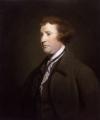Quotes by Edmund Burke
If you can be well without health, you may be happy without virtue.
Hypocrisy can afford to be magnificent in its promises, for never intending to go beyond promise, it costs nothing.
No passion so effectually robs the mind of all its powers of acting and reasoning as fear.
Nobility is a graceful ornament to the civil order. It is the Corinthian capital of polished society.
To make us love our country, our country ought to be lovely.
But the age of chivalry is gone. That of sophisters, economists, and calculators has succeeded; and the glory of Europe is extinguished forever.
Whenever a separation is made between liberty and justice, neither, in my opinion, is safe.
Those who don't know history are destined to repeat it.
Tyrants seldom want pretexts.
Nothing is so fatal to religion as indifference.
Ambition can creep as well as soar.
But what is liberty without wisdom, and without virtue? It is the greatest of all possible evils; for it is folly, vice, and madness, without tuition or restraint.
The only thing necessary for the triumph of evil is for good men to do nothing.
Our patience will achieve more than our force.
Free trade is not based on utility but on justice.
It is the interest of the commercial world that wealth should be found everywhere.
Custom reconciles us to everything.
When the leaders choose to make themselves bidders at an auction of popularity, their talents, in the construction of the state, will be of no service. They will become flatterers instead of legislators; the instruments, not the guides, of the people.
Religion is essentially the art and the theory of the remaking of man. Man is not a finished creation.
The effect of liberty to individuals is that they may do what they please: we ought to see what it will please them to do, before we risk congratulations.
What ever disunites man from God, also disunites man from man.
A disposition to preserve, and an ability to improve, taken together, would be my standard of a statesman.
The person who grieves suffers his passion to grow upon him; he indulges it, he loves it; but this never happens in the case of actual pain, which no man ever willingly endured for any considerable time.
Superstition is the religion of feeble minds.
The tyranny of a multitude is a multiplied tyranny.






